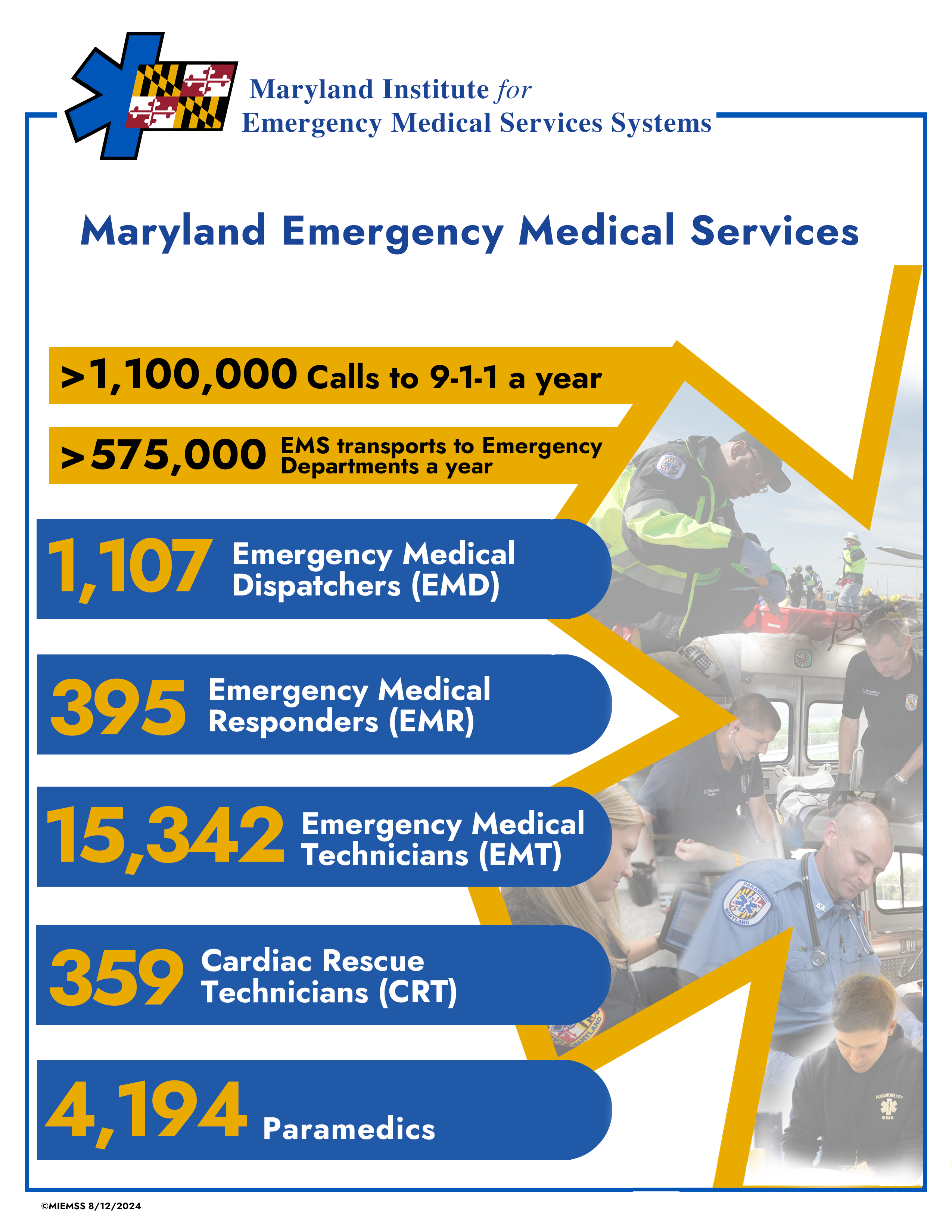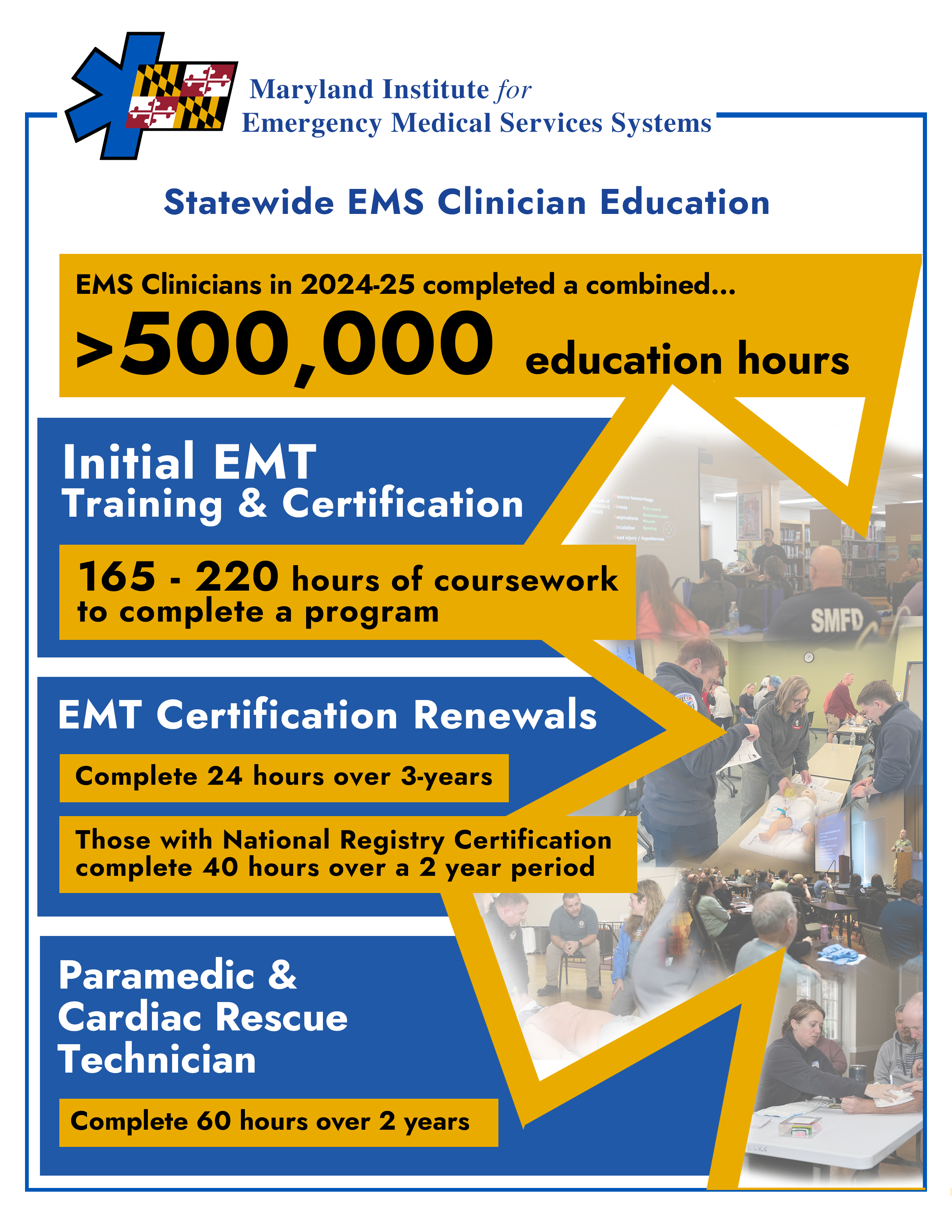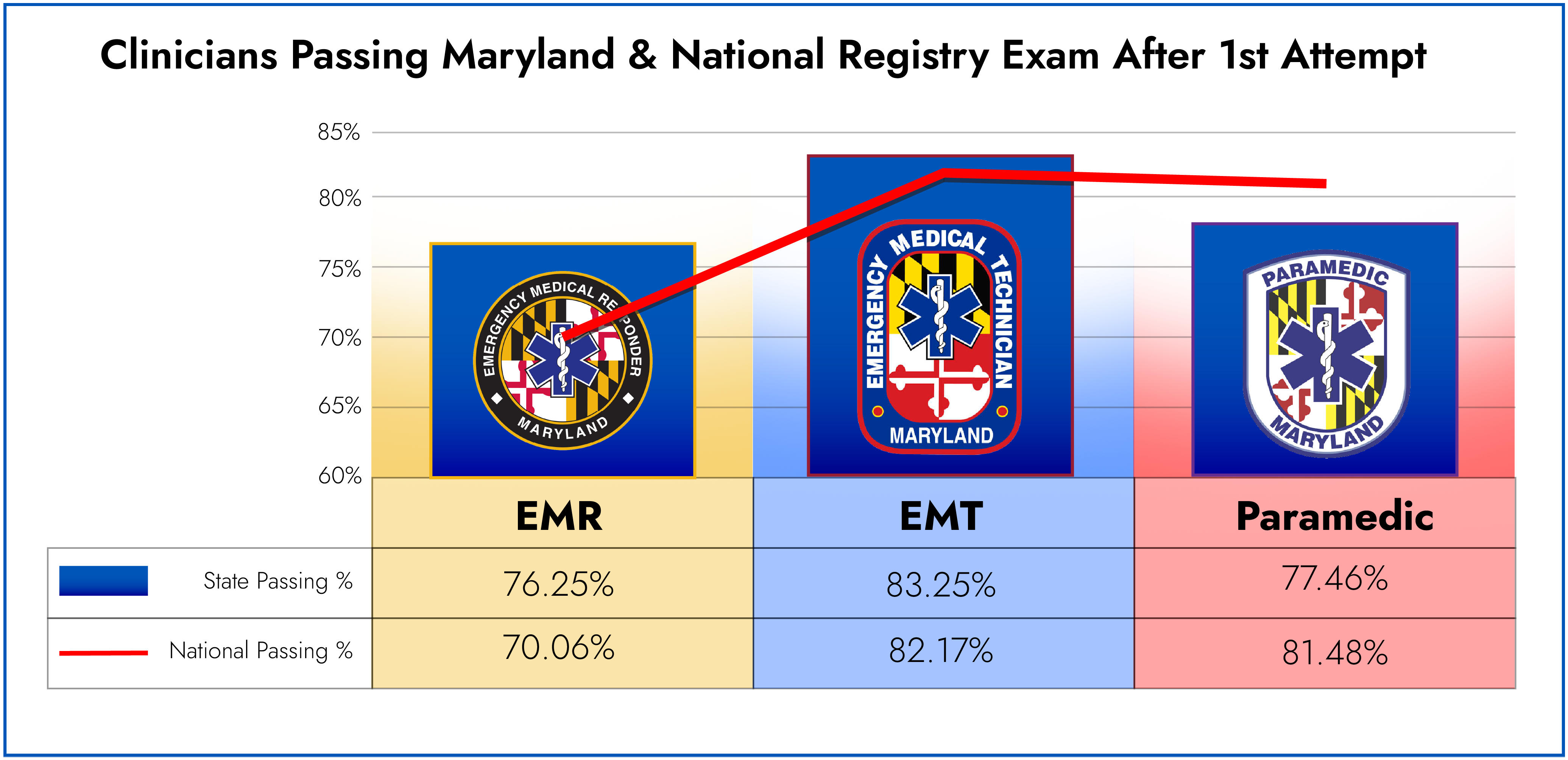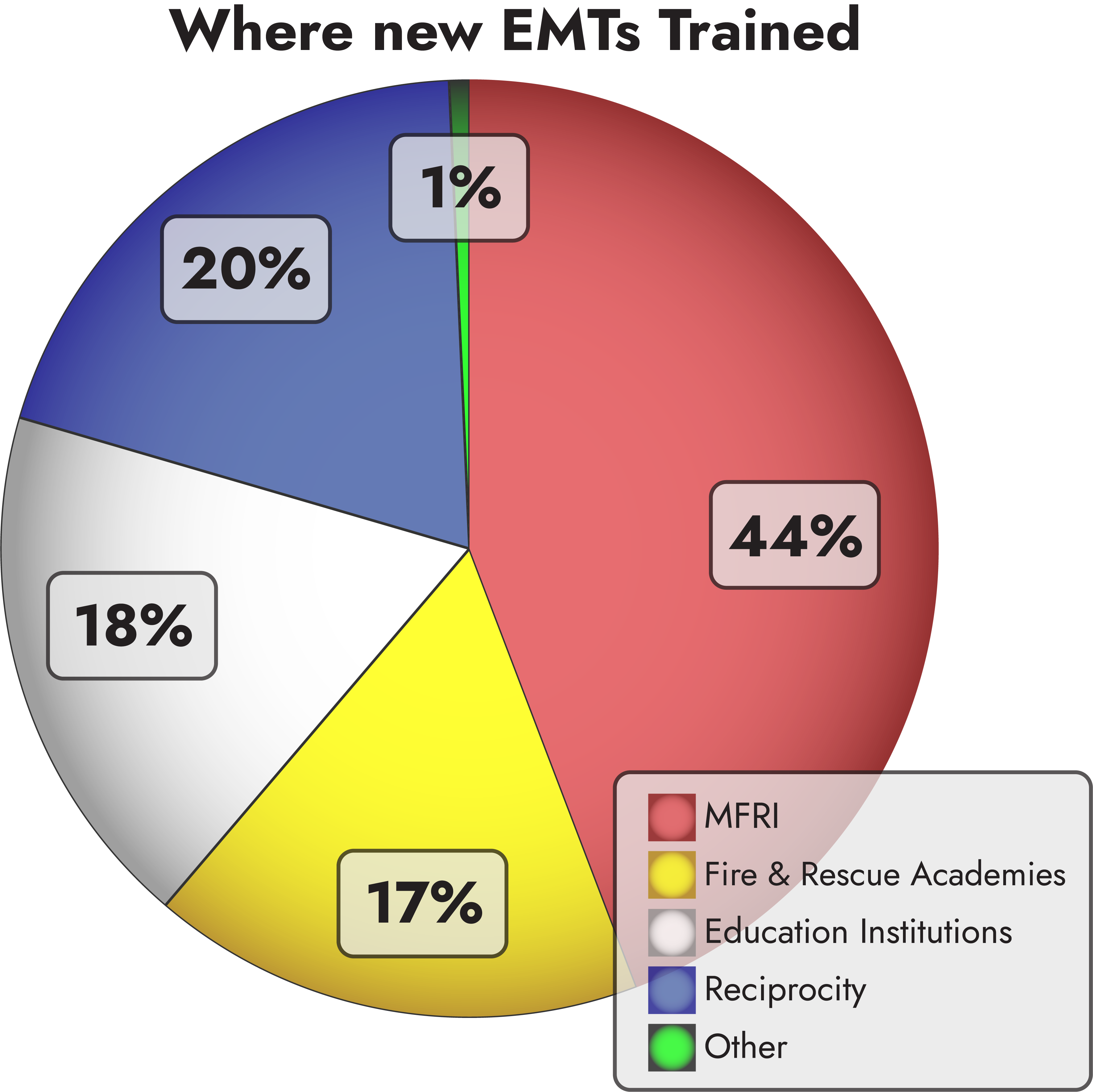The office of EMS Clinician Services (OCS) coordinates Maryland’s EMS educational programs. The office supports the efforts that advance the knowledge and skills of EMS clinicians who provide prehospital emergency care throughout the state. OCS provides support through four primary functions:
- Educational Oversight: Verifies that educational opportunities meet national and state requirements for licensure and certification.
- Clinician Support: Assists clinicians with registration, initial certification processes, license renewals, and reciprocities from other states.
- System Management: Maintains the licensure tracking system, ImageTrend®, and the Online Training Center that delivers training wherever the clinician is, at any time.
- Coordination of Effort: Through these coordinated activities, OCS ensures Maryland’s EMS clinicians receive the training, resources, and administrative support necessary to maintain high standards of emergency care.
EMS Clinician Preparedness and Qualifications
 Clinician Preparedness and Qualifications Maryland’s EMS clinician preparation focuses on robust educational standards that require training and effective medical oversight. This approach helps ensure clinicians are prepared to handle the demanding work of prehospital emergency care.
Clinician Preparedness and Qualifications Maryland’s EMS clinician preparation focuses on robust educational standards that require training and effective medical oversight. This approach helps ensure clinicians are prepared to handle the demanding work of prehospital emergency care.
- Educational Foundation: Maryland EMS programs maintain alignment with both NREMT standards and Committee on Accreditation for EMS Professions (CoAEMSP) requirements. CoAEMSP holds the distinction of being the only recognized accreditation organization for Paramedic programs under Commission on Accreditation of Allied Health Education Programs, the largest programmatic accreditor of health sciences professions education.
- Initial Certification requires EMT students to complete an accredited EMS education program. Once they have completed the educational program, students are required to pass the National Registry exam and MIEMSSadministered psychomotor examinations, which comply with NREMT standards. Upon meeting these requirements, MIEMSS issues and updates the students’ credentials in eLicensure.
- Clinician Certification Renewal requires clinicians to complete continuing education to maintain competencies and technical skills. EMS clinicians must stay current with annual updates to The Maryland Medical Protocols for Emergency Medical Services. Training videos and online verification are developed by the State Office of the EMS Medical Director, Media Services, and Clinician Services, and EMS clinicians are required to complete their work in the Online Training Center to ensure consistent, evidencebased care delivery.
- Reciprocity is a process by which individuals who possess EMS clinician certifications/licenses from other states may transfer their certification/license to Maryland. All candidates for reciprocity must have an equivalent state EMS license, certificate, or National Registry Credential and familiarity with The Maryland Medical Protocols for Emergency Medical Services.
For Clinicians Page
EMS Clinician Education
 There are 45 educational programs across Maryland that provide Initial clinician education for EMS. These programs are approved by the State EMS Board, and include the University of Maryland Baltimore County, 13 community colleges, seven public safety training academies, and the Maryland Fire and Rescue Institute (MFRI). Initial Certification for EMS clinicians may be as an Emergency Medical Responder, Emergency Medical Technician, or Paramedic. In 2020, Maryland stopped issuing new Cardiac Rescue Technician certifications. Continuing education required for maintenance of certification and licensure is offered throughout the state over the course of each year through MFRI, various academies, educational programs, conferences, seminars, and the Online Training Center.
There are 45 educational programs across Maryland that provide Initial clinician education for EMS. These programs are approved by the State EMS Board, and include the University of Maryland Baltimore County, 13 community colleges, seven public safety training academies, and the Maryland Fire and Rescue Institute (MFRI). Initial Certification for EMS clinicians may be as an Emergency Medical Responder, Emergency Medical Technician, or Paramedic. In 2020, Maryland stopped issuing new Cardiac Rescue Technician certifications. Continuing education required for maintenance of certification and licensure is offered throughout the state over the course of each year through MFRI, various academies, educational programs, conferences, seminars, and the Online Training Center.
Clinician Resources
The MIEMSS website, social media outlets, and Maryland EMS News serve as comprehensive resources, providing the state’s EMS clinicians with essential tools and information to support their professional practice.
- Clinical Resources and Protocols. Clinicians have immediate access to the current Maryland Medical Protocols for Emergency Medical Services, including regular updates, instructional videos, and supplementary guidance materials. This ensures that all clinicians have access to and can maintain current knowledge of state-approved treatment standards and clinical procedures.
- Communication and Updates. Real-time alerts, protocol updates, newsletters, and public health notices keep clinicians informed about important developments affecting their practice and patient care responsibilities.
- Educational Opportunities. Comprehensive listings of approved continuing education programs and online learning opportunities are available on the MIEMSS website. https://www.miemss.org/home/ems-providers#HowTo, providing a simple way for clinicians to identify and access training that meets their professional development needs and certification requirements.
- Administrative Support. Essential forms and applications for recertification, scope of practice modifications, 15 and special waiver requests are readily accessible, streamlining administrative processes for both clinicians and their employing agencies.
MIEMSS Online Training Center
The MIEMSS Online Training Center (OTC) delivers continuing education courses and training modules accessible anytime and anywhere, increasing access to high-quality educational content. In FY 2025, the platform supported over 68,610 registered users, with more than 15,000 active clinicians, and hosted 89 active courses, including the Hospital Base Station Course exams, EMT psychomotor remediation, and the ALS protocol orientation. Its many standout features include seamless integration with the eLicensure System: once a clinician completes a course on the OTC, their continuing education (CE) records are automatically transferred and synced directly into their eLicensure profile. This streamlined process ensures clinicians receive timely credit for attaining licensure and certification renewals. The OTC is the platform for delivery of essential protocol updates, regular yearly updates and revisions to The Maryland Medical Protocols for Emergency Medical Services, specialized trainings for pediatric care, and base station operations.
Online Training Center (OTC) Page

Collaboration and Constituents
 There are 45 educational programs across Maryland that provide Initial clinician education for EMS. These programs are approved by the State EMS Board, and include the University of Maryland Baltimore County, 13 community colleges, seven public safety training academies, and the Maryland Fire and Rescue Institute (MFRI). Initial Certification for EMS clinicians may be as an Emergency Medical Responder, Emergency Medical Technician, or Paramedic. In 2020, Maryland stopped issuing new Cardiac Rescue Technician certifications. Continuing education required for maintenance of certification and licensure is offered throughout the state over the course of each year through MFRI, various academies, educational programs, conferences, seminars, and the Online Training Center.
There are 45 educational programs across Maryland that provide Initial clinician education for EMS. These programs are approved by the State EMS Board, and include the University of Maryland Baltimore County, 13 community colleges, seven public safety training academies, and the Maryland Fire and Rescue Institute (MFRI). Initial Certification for EMS clinicians may be as an Emergency Medical Responder, Emergency Medical Technician, or Paramedic. In 2020, Maryland stopped issuing new Cardiac Rescue Technician certifications. Continuing education required for maintenance of certification and licensure is offered throughout the state over the course of each year through MFRI, various academies, educational programs, conferences, seminars, and the Online Training Center.
Updated 10-1-2025